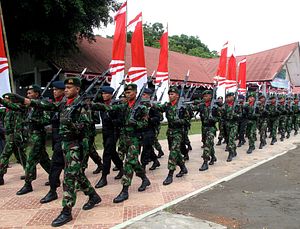On Monday, the Indonesian government confirmed that Indonesian President Joko “Jokowi” Widodo had nominated the country’s air force chief, Hadi Tjahjanto, as its next military chief. The nomination confirms months of speculation about his likely ascension to the post in a move that holds significance within the context of the evolution of Indonesia’s military as well as the country’s politics.
As I have noted before, Tjahjanto, who was just sworn in as air force chief earlier this year, had served previously as the Indonesian Defense Ministry’s inspector-general and, prior to that, he also served as military secretary, the National Search and Rescue Agency’s director for operations and training, spokesman for the Air Force, and the commander of an airport in Malang, East Java (See: “What Does Indonesia’s New Air Force Chief Pick Mean?”).
Tjahjanto has risen quickly within the military ranks in recent years and was already said to be Jokowi’s preferred candidate to replace the current commander of the Indonesian military (TNI), General Gatot Nurmantyo. Nurmantyo is no stranger to controversy, with recent incidents seeing him complicate military ties with Australia and the United States abroad as well as courting nationalists and Islamists at home (See: “Old Shadows in New Australia-Indonesia Spat”). Nurmantyo was officially set to retire next year following the end of his term in April, and speculation continues about his future political ambitions as Indonesia prepares for elections in 2019
On Monday, House Deputy Speaker Fadli Zon confirmed that the House of Representatives (DPR) had officially received a letter from Jokowi on the appointment of Tjahjanto as TNI commander, after which it was handed over for processing and deliberation. Tjahjanto’s nomination will require a fit and proper test by parliament, a process that is expected to be completed quickly within the next few weeks before it breaks for recess.
If it occurs as planned, Tjahjanto’s quick ascension from air force chief to military chief would be in line with traditional practice, whereby the Indonesian military chief position has rotated between the army, navy, and air force in a move to reverse the traditionally dominant role of the army (though Jokowi had departed from this by electing Nurmantyo to the post, since he replaced Moeldoko, who was also from the army).
Tjahjanto, unlike Nurmantyo, is not known to harbor major political ambitions, and having such a figure as military chief could be useful for Jokowi as he prepares for reelection in 2019. Some of Nurmantyo’s recent antics raised concerns about civil-military relations and growing religious extremism in the country, and Jokowi himself has had to occasionally weigh in (See: “The Trouble With Indonesia’s Ahok Test”). Tjahjanto is also a known quantity given his longstanding relationship with Jokowi and usually operates without drumming up the kind of controversy Nurmantyo sometimes stirs.
In commenting about his selection of Tjahjanto, Jokowi suggested that he would further the transition of the TNI to a professional force. Though it is far from surprising that Jokowi would speak highly of his own pick for the post, Tjahjanto has indeed made a series of statements as air force chief around the need to eradicate corruption and to ensure transparency and proper oversight in the procurement of equipment, which remain key challenges for the Indonesian military (See: “Indonesia’s Air Force Chief Highlights Corruption Menace Amid Anniversary”).
































